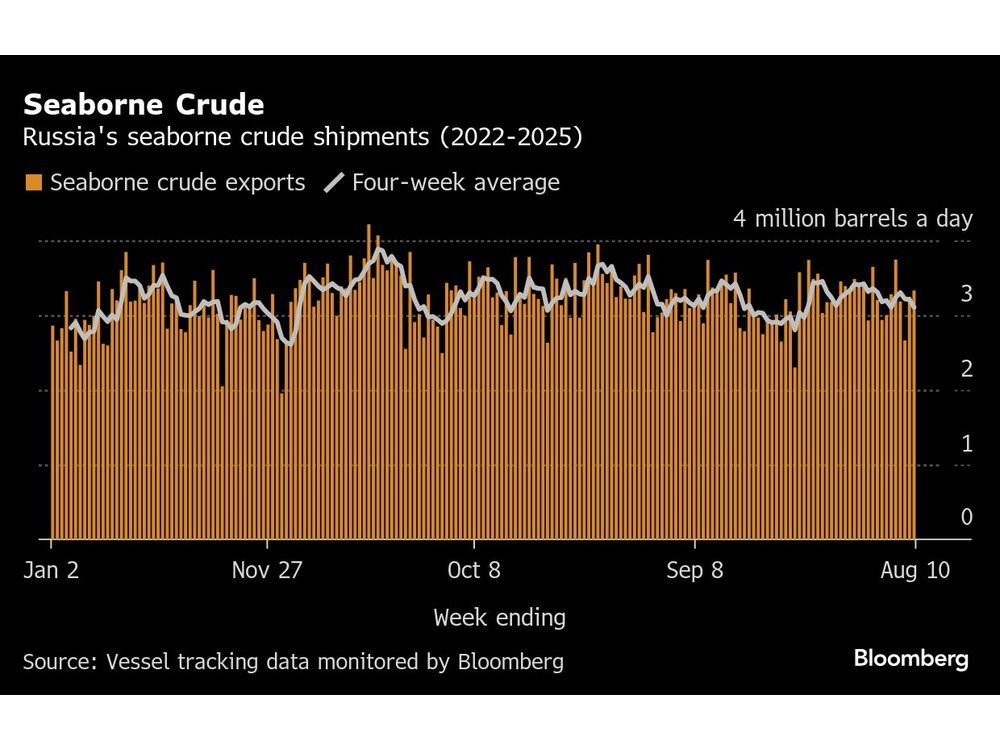Top Stories
EU Plans New Sanctions on Russian Banks and Oil Industry

The European Union is considering a new package of sanctions aimed at approximately six Russian banks and energy companies as part of ongoing efforts to pressure President Vladimir Putin to cease hostilities in Ukraine. This potential move represents the EU’s 19th set of sanctions since the escalation of the conflict in February 2022 and may additionally target Russia’s payment systems and cryptocurrency exchanges, alongside further restrictions on the oil trade.
In a bid to strengthen the impact of these sanctions, EU officials are expected to coordinate their actions with the United States. A delegation from the EU will visit Washington this week to engage with U.S. officials regarding collaborative measures. The discussions aim to align strategies in imposing sanctions that could lead to a significant economic downturn for Russia, thereby incentivizing a return to peace talks concerning Ukraine.
Scott Bessent, U.S. Treasury Secretary, emphasized the necessity of unified pressure during an interview on NBC’s Meet the Press. He remarked, “We are prepared to increase pressure on Russia, but we need our partners in Europe to follow.” The U.S. and EU are exploring various punitive measures, including secondary tariffs, with the hope that this will ultimately facilitate negotiations between Russia and Ukraine.
Despite existing sanctions, Russia has managed to mitigate some adverse effects by sourcing restricted goods from China and other countries, as well as by finding new markets for its oil and gas in India. The upcoming sanctions may expand to include new levies on Russian oil buyers and could target Russia’s covert oil tanker fleet and major energy firms such as Rosneft PJSC and Lukoil PJSC.
Details of Proposed Sanctions
The EU’s new sanctions package could include enhancements to existing restrictions on Russian shadow vessels and oil traders in third countries. Additionally, considerations are underway for banning the re-insurance of tankers involved in the oil trade. The bloc is also contemplating tighter sanctions on major Russian oil companies by eliminating current exemptions that firms like Rosneft currently enjoy.
Moreover, the EU is weighing export bans on certain goods and chemicals vital to Russia’s military industry. This scrutiny extends to foreign businesses, particularly those in China, that supply materials to Russia’s military sector. Beijing has become an increasingly critical supplier, significantly aiding Moscow’s drone production, which has been used in attacks on Ukrainian cities.
Separately, the EU is considering deploying its “anti-circumvention tool” against Kazakhstan for the first time. This measure could prohibit the importation of specific machinery that is reportedly being diverted to Russia for weapon production. The implementation of this tool requires extensive evidence and must receive approval from EU member states.
Future Developments and Considerations
The proposed sanctions package is still under discussion and may evolve as EU officials consult with member states over the coming days and weeks. Other measures on the table include visa restrictions, penalties on ports that engage with sanctioned vessels, and sanctions related to services such as artificial intelligence that have military applications.
EU ambassadors were briefed on these proposed measures over the weekend, and a formal proposal is anticipated shortly. As the international community continues to grapple with the complexities of the situation in Ukraine, the EU’s actions reflect an ongoing commitment to exerting economic pressure on the Russian government.
-

 Education3 months ago
Education3 months agoBrandon University’s Failed $5 Million Project Sparks Oversight Review
-

 Science4 months ago
Science4 months agoMicrosoft Confirms U.S. Law Overrules Canadian Data Sovereignty
-

 Lifestyle3 months ago
Lifestyle3 months agoWinnipeg Celebrates Culinary Creativity During Le Burger Week 2025
-

 Health4 months ago
Health4 months agoMontreal’s Groupe Marcelle Leads Canadian Cosmetic Industry Growth
-

 Science4 months ago
Science4 months agoTech Innovator Amandipp Singh Transforms Hiring for Disabled
-

 Technology4 months ago
Technology4 months agoDragon Ball: Sparking! Zero Launching on Switch and Switch 2 This November
-

 Education4 months ago
Education4 months agoRed River College Launches New Programs to Address Industry Needs
-

 Technology4 months ago
Technology4 months agoGoogle Pixel 10 Pro Fold Specs Unveiled Ahead of Launch
-

 Business3 months ago
Business3 months agoRocket Lab Reports Strong Q2 2025 Revenue Growth and Future Plans
-

 Technology2 months ago
Technology2 months agoDiscord Faces Serious Security Breach Affecting Millions
-

 Education4 months ago
Education4 months agoAlberta Teachers’ Strike: Potential Impacts on Students and Families
-

 Education3 months ago
Education3 months agoNew SĆIȺNEW̱ SṮEȽIṮḴEȽ Elementary Opens in Langford for 2025/2026 Year
-

 Science4 months ago
Science4 months agoChina’s Wukong Spacesuit Sets New Standard for AI in Space
-

 Business4 months ago
Business4 months agoBNA Brewing to Open New Bowling Alley in Downtown Penticton
-

 Business4 months ago
Business4 months agoNew Estimates Reveal ChatGPT-5 Energy Use Could Soar
-

 Technology4 months ago
Technology4 months agoWorld of Warcraft Players Buzz Over 19-Quest Bee Challenge
-

 Business4 months ago
Business4 months agoDawson City Residents Rally Around Buy Canadian Movement
-

 Technology4 months ago
Technology4 months agoFuture Entertainment Launches DDoD with Gameplay Trailer Showcase
-

 Technology2 months ago
Technology2 months agoHuawei MatePad 12X Redefines Tablet Experience for Professionals
-

 Top Stories3 months ago
Top Stories3 months agoBlue Jays Shift José Berríos to Bullpen Ahead of Playoffs
-

 Technology4 months ago
Technology4 months agoGlobal Launch of Ragnarok M: Classic Set for September 3, 2025
-

 Technology4 months ago
Technology4 months agoInnovative 140W GaN Travel Adapter Combines Power and Convenience
-

 Science4 months ago
Science4 months agoXi Labs Innovates with New AI Operating System Set for 2025 Launch
-

 Technology4 months ago
Technology4 months agoNew IDR01 Smart Ring Offers Advanced Sports Tracking for $169








